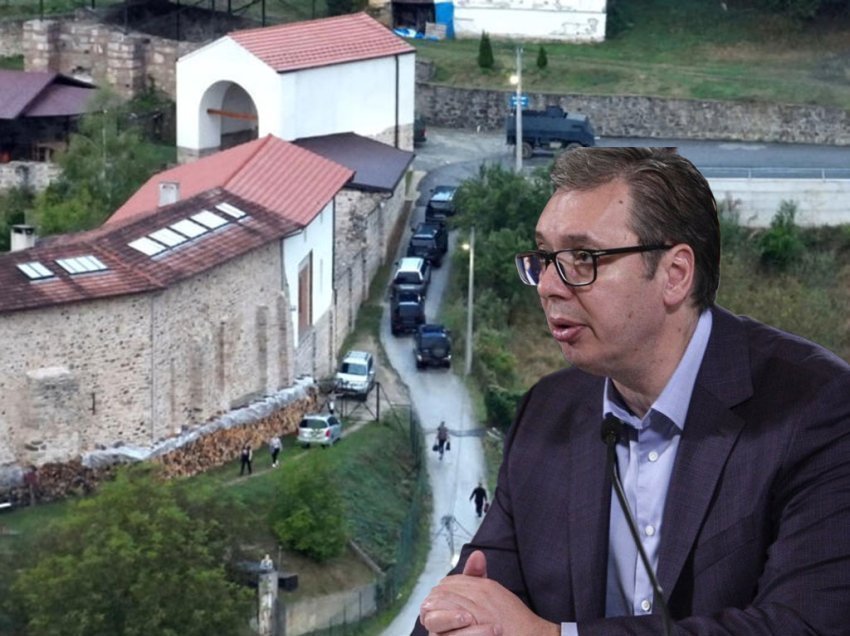Konrad Clewing, a Balkan expert at the Leibniz Institute for East and Southeast European Studies in Regensburg, has commented on the alarm raised by American General Wesley Clark and Kosovo Prime Minister Albin Kurti. They claim Serbian President Aleksandar Vučić wants to do in Kosovo what Russian President Vladimir Putin is doing in Ukraine.
The German historian does not rule out the possibility of such an event happening in the medium or long term. However, for now, he believes Serbia cannot attack the north, let alone the entirety of Kosovo.
Speaking to “Bota Sot,” Clewing said Serbia’s goal with the attack on September 24th last year was to occupy northern Kosovo without military resistance.
“Given the failure of last September’s attempt to create a situation where Serbia could invade northern Kosovo without facing military resistance from KFOR (which I believe the Banjska incident aimed for), I don’t think there’s an immediate risk of a full-scale attack on the north by Serbia, much less the whole of Kosovo. But in the medium term, the military situation in the north is not stable enough to prevent such things from recurring. And in the long term, as Serbia continues to pursue revisionist goals for Kosovo as a whole, the entire society in Kosovo is not safe from that kind of risk,” he declared.
To prevent even the slightest threat, the expert mentioned three measures that Kosovo authorities should take. First, he calls for strengthening Kosovo’s ties with its allies and NATO.
“There are three different measures needed to prevent both small and large threats.
The first measure is to reinforce coordination and ties between Kosovo and its key allies and NATO as a whole, and to make those partners understand what the real military risks are for the foreseeable future (where unfortunately Serbia can be expected to maintain its hostility towards Kosovo’s existence), and what those threats mean for the (in)stability of the Balkans and the larger interests not only of Kosovo but also of the West,” emphasized Konrad Clewing.
As a second measure, the expert mentions improving Kosovo’s diplomatic capacities and activities.
“Secondly, Kosovo needs to improve its diplomatic capacities and activities to overcome the fundamental obstacle of non-recognition by four NATO member states against Kosovo’s membership prospects in NATO. Even if recognition from those states cannot be achieved, non-recognizers should not be given the position to veto Kosovo’s membership prospects in NATO (or allow others to use them as a justification for not offering this prospect to Kosovo). So far, the Kosovo government has failed to effectively use the momentum provided by Russia’s attack on Ukraine to make Western partners understand that Kosovo’s international position needs urgent improvement,” said the historian.
To militarily deter Serbia, he believes Kosovo needs to apply more seriously for NATO membership.
“Thirdly, to become a more serious applicant for NATO membership and to deeply contribute to deterring Serbia from any military action. It is a necessity to further improve Kosovo’s own military capacities. Measures in this direction have been taken, but they need to be a sustained and strategic commitment by the government and society (i.e., taxpayers),” added Konrad Clewing for “Bota Sot.”
General Clark, in a joint interview with Prime Minister Albin Kurti for CNN, said that “Serbia and Russia are imitating each other.”
“The hand of Russia is felt in the Balkans, Serbia is Russia’s hand in the Balkans and serves Russia’s interests. Vučić is smart, he wants to appear as if he is playing on both sides, but when the time comes, he will do what Putin wants him to do.
We have seen a lot of violence, murders in the last 30 years and we thought NATO had stopped it, but if there are problems in Ukraine that problem will come to the Balkans and leaders like Prime Minister Kurti must face it,” Clark said among other things.
Konrad Clewing, a Balkan expert at the Leibniz Institute for East and Southeast European Studies in Regensburg, has commented on the alarm raised by American General Wesley Clark and Kosovo Prime Minister Albin Kurti. They claim Serbian President Aleksandar Vučić wants to do in Kosovo what Russian President Vladimir Putin is doing in Ukraine.
The German historian does not rule out the possibility of such an event happening in the medium or long term. However, for now, he believes Serbia cannot attack the north, let alone the entirety of Kosovo.
Speaking to “Bota Sot,” Clewing said Serbia’s goal with the attack on September 24th last year was to occupy northern Kosovo without military resistance.
“Given the failure of last September’s attempt to create a situation where Serbia could invade northern Kosovo without facing military resistance from KFOR (which I believe the Banjska incident aimed for), I don’t think there’s an immediate risk of a full-scale attack on the north by Serbia, much less the whole of Kosovo. But in the medium term, the military situation in the north is not stable enough to prevent such things from recurring. And in the long term, as Serbia continues to pursue revisionist goals for Kosovo as a whole, the entire society in Kosovo is not safe from that kind of risk,” he declared.
To prevent even the slightest threat, the expert mentioned three measures that Kosovo authorities should take. First, he calls for strengthening Kosovo’s ties with its allies and NATO.
“There are three different measures needed to prevent both small and large threats.
The first measure is to reinforce coordination and ties between Kosovo and its key allies and NATO as a whole, and to make those partners understand what the real military risks are for the foreseeable future (where unfortunately Serbia can be expected to maintain its hostility towards Kosovo’s existence), and what those threats mean for the (in)stability of the Balkans and the larger interests not only of Kosovo but also of the West,” emphasized Konrad Clewing.
As a second measure, the expert mentions improving Kosovo’s diplomatic capacities and activities.
“Secondly, Kosovo needs to improve its diplomatic capacities and activities to overcome the fundamental obstacle of non-recognition by four NATO member states against Kosovo’s membership prospects in NATO. Even if recognition from those states cannot be achieved, non-recognizers should not be given the position to veto Kosovo’s membership prospects in NATO (or allow others to use them as a justification for not offering this prospect to Kosovo). So far, the Kosovo government has failed to effectively use the momentum provided by Russia’s attack on Ukraine to make Western partners understand that Kosovo’s international position needs urgent improvement,” said the historian.
To militarily deter Serbia, he believes Kosovo needs to apply more seriously for NATO membership.
“Thirdly, to become a more serious applicant for NATO membership and to deeply contribute to deterring Serbia from any military action. It is a necessity to further improve Kosovo’s own military capacities. Measures in this direction have been taken, but they need to be a sustained and strategic commitment by the government and society (i.e., taxpayers),” added Konrad Clewing for “Bota Sot.”
General Clark, in a joint interview with Prime Minister Albin Kurti for CNN, said that “Serbia and Russia are imitating each other.”
“The hand of Russia is felt in the Balkans, Serbia is Russia’s hand in the Balkans and serves Russia’s interests. Vučić is smart, he wants to appear as if he is playing on both sides, but when the time comes, he will do what Putin wants him to do.
We have seen a lot of violence, murders in the last 30 years and we thought NATO had stopped it, but if there are problems in Ukraine that problem will come to the Balkans and leaders like Prime Minister Kurti must face it,” Clark said among other things.







